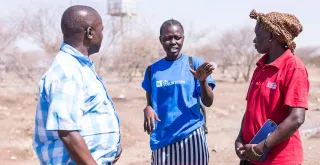In collaboration with the UN Refugee Agency (UNHCR), the United Nations Volunteers (UNV) programme and partners have developed and implemented volunteer initiatives with refugees and host communities in Kakuma Refugee Camp in Kenya. These activities enhance community security and refugee protection through refugee engagement, with a focus on strengthening the social cohesion between refugee and host populations. Partners include the Lutheran World Federation and County Government of Turkana, Kenya. The project is supported by the Government of Germany, represented by the Ministry for Economic Cooperation and Development (BMZ).
The project consisted of recruiting refugees from the camp and members from the host communities as Refugee Outreach Volunteers. Additionally, UNV used its refugee-to-refugee volunteer modality to recruit and deploy one refugee identified in the camp as a UN Volunteer. The Refugee Outreach Volunteers served with UNHCR and were provided with the necessary capacities, knowledge and resources to contribute to addressing their own protection needs.
For years, refugees have been mainly dependent on humanitarian assistance with minimal livelihood and self-reliance opportunities. UNV’s volunteer assignments offered refugees the opportunity to take an active role within Kakuma Refugee Camp, by participating in community outreach and social protection activities that not only provide a safety-net for the camp’s inhabitants but also contribute to their wellbeing and development.
In this project, refugees are partners in development efforts and empowered to act as drivers of the change and of the solutions they want to see.
Main activities of the project have included:
- Recruitment of Refugee Outreach Volunteers from both the refugee and the host communities to serve with UNHCR. After receiving training, they help in identifying refugees at risk and needing assistance, in realizing the timely management of cases and in providing the necessary basic individual counselling through home visits. Volunteers were given bicycles to facilitate their mobility.
- Training of Refugee Outreach Volunteers in community issues such as public health, security, education, and sexual and gender-based violence.
- Joint activities between the refugee and the host communities (e.g. football tournaments) to build mutual understanding, to enhance dialogue and to ensure peaceful co-existence. These activities are to facilitate community-based security and protection mechanisms. Two community volunteerism centres were established to host joint activities.
Results achieved
From 2017 to 2019, Refugee Outreach Volunteers ensured a peaceful, sustainable and secure co-existence within the refugee community and towards the host community around the Kakuma Refugee Camp. Project activities have brought harmony between host and refugee communities and promoted effective coordination on issues of conflict and security.
At its completion, the project has mobilized and trained 146 Refugee Outreach Volunteers (11 from the host communities, 135 from Kakuma Refugee Camp). These volunteers have formed four women and four youth groups that engage on community development activities in health, water and sanitation, sexual and gender-based violence, entrepreneurship, education, environment and sports. Thanks to the project, the Refugee Outreach Volunteers have gained a sense of achievement.
As part of the project, two community volunteerism centres were established to host joint activities between the refugee and the host communities, offering a space of creativity and assembly and bringing people together for workshops and events, thereby enhancing compassion and understanding of each other.
Throughout the Kakuma Refugee Camp, the project has strengthened the conception that volunteerism opens powerful pathways through which people can counter exclusion and engage on issues that affect their lives. This will continue to inspire both the refugee and host communities.
Challenges and how they were addressed
This project piloted innovations to bring together refugee and host communities and at the start there was an element of mistrust. The refugees at Kakuma are from several countries and there were issues of cultural conflicts that affected interests to participate in project activities. In January 2018, more than 185,000 refugees resided in Kakuma Refugee Camp. Residents of the camp suffered from a harsh, dry climate and a higher population than current capacities allow.
In addition, tensions and conflicts between the local Turkana people and the refugee community have been present for years and have been further exacerbated by environmental stress, limited resources, and a feeling that refugees are more economically privileged (as they receive aid that the local community does not).
Against this background, setting up and starting the actual project implementation took longer than expected. These challenges were addressed through advocacy and outreach efforts among the two communities.

